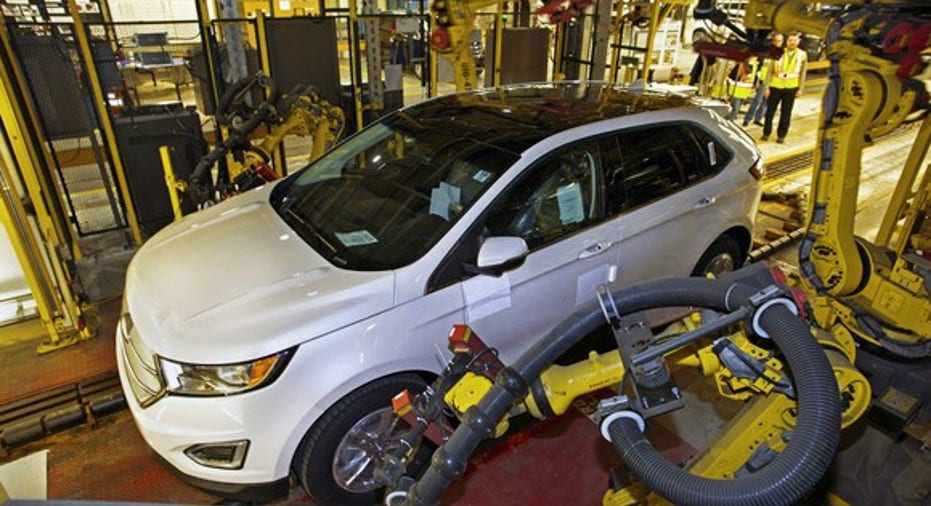Ford Gets Four Years of Labor Peace in Canada

An Edge SUV is assembled at Ford's Oakville Assembly Plant in Ontario. Workers at three Ford factories voted toapprove a new four-year labor deal on Sunday. Image source: Ford Motor Company.
Ford Motor Company (NYSE: F) and its Canadian workers have a new deal. The union representing Ford's hourly workers in Canada said on Sunday that its members have ratified a new four-year contract with the Blue Oval.
How the vote went down
The deal covers the hourly workers at three Ford factories and two office locations in Canada that are represented by the Unifor labor union. The factories include two engine plants in Windsor, Ontario, and an important assembly plant in Oakville, Ontario:
- Windsor Engine employs about 600 workers and builds V8 and V10 engines for Ford's trucks.
- Essex Engine, also in Windsor, employs about 800 workers and builds 5.0-liter V8 engines for Ford trucks and the Mustang.
- Oakville Assembly employs about 5,000 workers, the majority of Ford's Canadian workforce. It builds the Ford Edge, Ford Flex, Lincoln MKX, and Lincoln MKT crossover SUVs.
Workers at the two engine plants voted to approve the deal by wide margins, but a slight majority of workers at Oakville voted against the new contract.
What Ford gave up in the new deal
Like its rivals General Motors (NYSE: GM) and Fiat Chrysler Automobiles (NYSE: FCAU), both of which recently completed new four-year deals with Unifor, Ford agreed to modest wage increases for veteran workers, and a schedule of pay increases for workers over a 10-year "grow-in" period. (The "grow-in" period was controversial; workers at Oakville wanted it shortened.)
According to the union, Ford promised to invest 713 million Canadian dollars ($533 million) in wage increases, new jobs, and new-product programs, including:
- Windsor Engine will be the "sole global manufacturing source" for a new high-volume engine program, and will also build a new 4.8-liter V8 engine for Ford F-150 pickups.
- Ford will spend about $100 million on updates to some of the crossovers made at Oakville, and it will keep the slow-selling Flex in production until 2020.
What Ford got in the new deal
First and foremost, Ford secured four years of labor peace at a price it could afford. That often goes overlooked, but it's extremely important.
As with the deals with GM and FCA, Ford's deal includes a significant concession that could save it considerable money over time: While current employees participate in a defined-benefit pension plan, new hires will be enrolled in a defined-contribution plan similar to a U.S. 401(k) plan.
The upshot: All of the Detroit Three escaped relatively unscathed
Ford, GM, and FCA all operate important factories in Canada. New-contract negotiations always bring a risk of production disruptions if negotiators can't come to terms; in all three cases, a strike could have quickly become a costly mess.
Fortunately for all concerned, that didn't happen. New deals were secured that give workers some incremental improvements, at prices that didn't materially impact the automakers' cost bases in North America. I think everyone gets to declare victory here.
A secret billion-dollar stock opportunity The world's biggest tech company forgot to show you something, but a few Wall Street analysts and the Fool didn't miss a beat: There's a small company that's powering their brand-new gadgets and the coming revolution in technology. And we think its stock price has nearly unlimited room to run for early in-the-know investors! To be one of them, just click here.
John Rosevear owns shares of Ford and General Motors. The Motley Fool owns shares of and recommends Ford. The Motley Fool recommends General Motors. Try any of our Foolish newsletter services free for 30 days. We Fools may not all hold the same opinions, but we all believe that considering a diverse range of insights makes us better investors. The Motley Fool has a disclosure policy.



















